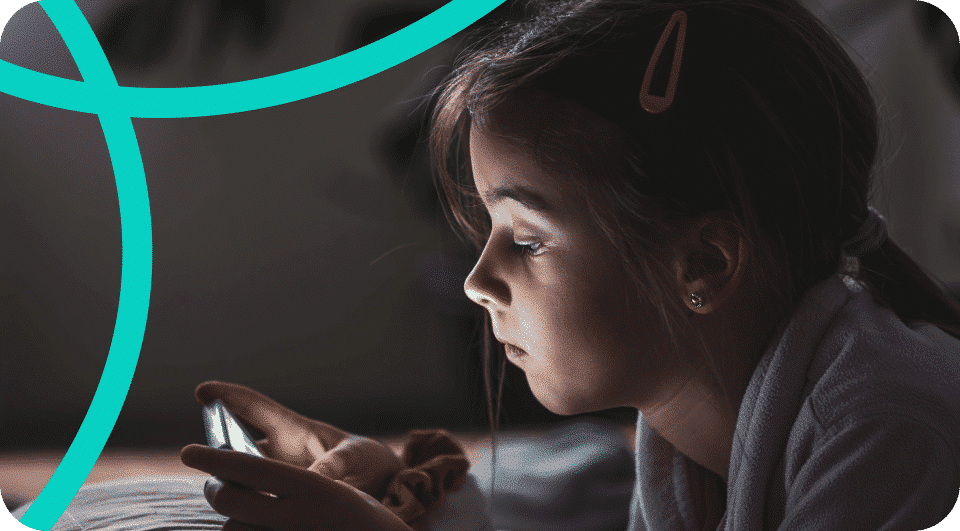Join us for the online Event and learn how to manage device use with no refusals, fights or negotiating.
Improve your child’s digital journey and optimize screen time for kids. Unlock a world of learning and balanced use of technology for their development. Act now and shape a brighter future for your little ones!
Get kids off screens with ease! Wondering if babies can watch TV? Join our event to learn new techniques for effective communication with your child!
Learn in 5 steps how to use new and efficient techniques for managing your child’s tantrums with ease when you limit their screen time.
Join us now and discover powerful strategies for improving communication and getting your child to listen!
Discover how to be there for your child and don’t let screens take your place! Avoid parental guilt by limiting screen time for kids with effective tips and strategies.
Unlock the secret to getting your child to stop ignoring you with our guidance on managing screen time for kids. Learn through our proven strategies to boost their motivation and responsiveness.

How would you feel knowing that technology has negative effects on child development?
As parents, we often find ourselves struggling to balance our busy lives with quality time spent with our kids. In a world where screens are a constant distraction, it’s easy to fall into the trap of relying on TV, tablets, or phones to keep our little ones occupied.
Nonetheless, we can’t help but wonder, “Is TV bad for babies?” or “Is it too soon to give a kid a tablet?” or “How much screen time is OK for kids?” If you’re looking for ways to connect with your child without relying on screen time, our parenting program can help.
The more time children spend with their screens, the more addicted they get to the phone, TV, laptop, etc. Children and technology can quickly become inseparable, but it’s crucial to be mindful of screen time recommendations by age to ensure their health and development. Excessive TV time can have adverse effects, so it’s important to recognize the signs and set healthy limits. But what happens when we don’t set those limits?
They quickly form a habit, and we find ourselves struggling to change the situation. We try to impose our authority, but it only leads to frustration and tantrums from both sides.
We realize that technology has changed the way our child thinks and focuses, but we don’t know how to motivate them to cooperate willingly. You can find out more details about this topic in the online Event: Why Screens Harm Your Child: 5-Step Guide to Optimize Screen Time for Kids. Save your seat now!
👉 Curious about how video games affect your child? Check out our articles: ‘The Link Between Your Child’s Restlessness & the Negative Effects of Video Games‘ and ‘How to Handle Video Game Addiction in Your Child.’ Get the scoop on these topics – start reading now!
Getting kids off screens can be a challenge, but it is not impossible.
One effective technique is to involve them in activities that they enjoy and that require them to be away from screens. For example, if your child likes to play sports, you can encourage them to join a local team or take them to the park to play with friends.
You can also involve them in creative activities such as drawing, painting, or building things with blocks or Legos. These types of activities can help to stimulate their imagination and creativity while also keeping them away from screens.
Another effective way to motivate children to reduce their screen time is to lead by example. Children learn by watching their parents and imitating their behavior.
If they see their parents spending more time on screens than they do on other activities, they are likely to do the same. By setting a good example and limiting your own screen time, you can encourage your children to do the same.
Positive reinforcement is a powerful tool in motivating children to reduce screen time for kids. Instead of focusing on punishing them for spending too much time in front of screens, consider rewarding them for making progress towards reducing their screen time. For example, you could offer them a special treat or take them on a fun outing if they meet their screen time goals for the week.
By providing incentives and positive reinforcement, children will feel more in control of their choices and more motivated to continue reducing their screen time. It’s important to set clear goals and expectations for screen time reduction and celebrate progress made along the way.
Positive reinforcement is not only effective in reducing screen time. It can also help to build your child’s self-esteem and sense of accomplishment. By recognizing and praising their efforts, you can foster a positive mindset towards limiting screen time for kids and encourage them to keep making healthy choices.
In conclusion, as parents, it’s important to be aware of the negative effects of technology on children’s development and find ways to reduce screen time for kids. This can be achieved by limiting screen time, setting clear rules and expectations, using technology in a more productive way, and motivating children through positive reinforcement.
Patrick Ney is an author and Lead Trainer at All About Parenting, a global parenting organization active in more than thirty countries around the world. An inspiring speaker who has featured at Tedx, he has led hundreds of workshops, seminars and meetings for more than a hundred thousand parents worldwide. His first book, “When At the Zoo Watch the Humans” was a No. 1 Amazon Best Seller and he’s just released his first book for children, “What Do Humans Taste Like?” a fun book designed to help children develop theory of mind thinking.
Limiting screen time for kids can be difficult, especially when they become engrossed in what they are watching. However, there are some steps you can take when you want to know how to reduce screen time or how to turn off screen time:
Need more practical solutions? Sophie, our clever AI assistant, is ready to help you.
According to the American Academy of Pediatrics (2022) recommendations, infant screen time should be avoided as much as possible. It is recommended that children under have no screen time at all. Children aged 2 to 5 should have one hour or less of screen time.
Children aged 6 to 12 should have no more than two hours of screen time per day. These are the recent maximum screen time limits by age recommendations right from the American Academy of Pediatrics (2022).
It is known that too much screen time may cause physical changes in our brains. Research has linked excessive screen time to various health problems, such as obesity, poor sleep, and behavioral issues. Moreover, it can interfere with a child’s social, emotional, and academic development and may result in a lack of interest in other activities. If you require additional information regarding why too much screen time for your teenager can be damaging, we address this topic in our masterclass “Why Screens Harm Your Child.”
Parents should set clear and consistent boundaries to reduce exposure to technology, such as limiting daily usage. Average screen time by age should be respected. It’s equally important to create rules around the type of content they have access to. In order to prevent children from being exposed to unsuitable content, monitoring their screen time closely is essential.
Other ways of managing children’s use of electronic devices could be:
Incorporating educational activities can help children develop different skills and interests while minimizing their reliance on screens.
Finally, parents should model healthy screen time habits to encourage their children to follow suit. Parents can promote a healthier relationship between children and technology by setting a positive example.
„Should kids have phones?” is one of the most common parents’ questions. When considering whether or not to provide your child with a phone, various factors must be taken into account. Our parenting experts provide tips on ways to manage your children’s electronic device usage in our masterclass “Why Screens Harm Your Child.”
Firstly, understand the reason why your daughter desires a phone. Is it due to peer pressure, or a specific need such as safety concerns or keeping in touch with family members? Knowing the reason behind the request can help you make a more informed decision.
Secondly, understand the negative effects of smartphones on child development and set clear boundaries and rules for phone usage, including:
It’s vital to have open talks about internet-related risks like cyberbullying and online predators.
Moreover, starting with a basic phone that doesn’t have access to the internet, social media, or other potentially harmful applications can be helpful in gradually familiarizing your child with phone usage and building trust.
Ultimately, deciding whether or not to provide your child with a phone should be based on your family’s specific needs and values. It’s critical to evaluate the potential benefits and drawbacks and make a decision that aligns with your family’s values.
If you choose to provide your daughter with a phone, it’s important to remember that it is a privilege, not a right. You can withdraw phone privileges if your child misuses the phone, breaks the rules or violates your trust.
In conclusion, while there isn’t a specific age when a child should get a phone, it’s crucial to consider the decision carefully and establish clear expectations and rules for phone usage. Strict limits regarding screen time for kids should be implemented. This will help your child use the phone responsibly and safely.
According to American Academy of Pediatrics experts, babies shouldn’t have any screen time. It’s recommended that children between 2 and 5 have no more than one hour of screen time per day. Children aged 6 years and older should have no more than two hours daily.
Developing healthy habits early on in life can significantly impact a child’s overall health and well-being. However, establishing new habits takes time, for both parents and children.
Nowadays, the negative effects of screen time on child development are more visible than ever before.
According to Mayo Clinic, too much screen time effects could mean:
If you want to find more information, we recommend our online parenting class, “Why Screens Harm Your Child.” Find out how to deal with „too much screen time effects” and get more practical solutions for your concern.
Excessive screen time, including watching TV, can negatively impact children’s overall health, particularly their eyesight. Prolonged screen time can lead to:
especially in young children whose eyesight is still developing.
If you are concerned about your child’s eyesight, speaking to a pediatrician or an ophthalmologist is crucial.
Moreover, the American Academy of Pediatrics (AAP) recommends that children under 18 months avoid screen time altogether, except for video chatting. This is because screen time and baby brain development don’t go well together. Babies need interactive, hands-on experiences to promote their cognitive, social, and physical development. Excessive screen time during this critical stage may hinder language development, attention span, and social interactions.
Babies learn best through real-world experiences, such as face-to-face interactions, exploring their surroundings, and engaging with caregivers. Screens can be overstimulating and may interfere with their natural development processes.
In conclusion, it is essential to monitor and decrease baby screen time to ensure their well-being. While watching TV may be a common form of entertainment for children, it’s crucial to limit screen time and encourage alternative activities like reading, drawing, painting, playing with toys and playing outside. To keep your child’s eyes healthy and prevent potential problems, take proactive steps and limit their screen time.
In our masterclass “Why Screens Harm Your Child” we offer ways of managing children’s consumption of electronic devices.
As a concerned mom, attending the masterclass on “Why Screens Harm Your Child” was a game-changer for our family. Implementing the strategies learned, we witnessed remarkable improvements in our child’s well-being. Limiting screen time for kids led to increased engagement, imagination, and social activity. We now prioritize quality time together, fostering deeper connections. This masterclass is a must for any mom worried about the effects of screen time on their child’s well-being.
Attending All About Parenting’s masterclass on “Why Screens Harm Your Child” was life-changing. I learned about the negative impact of excessive screen time for babies and immediately implemented strict screen time rules. I also became more mindful of my own screen use in order to set a positive example. Thanks to the masterclass, I now prioritize interactive playtime and stimulating activities for my child’s healthy development. All About Parenting provided invaluable insights and practical advice that positively transformed our family’s well-being.
I used to let my baby watch TV all day, but everything changed after I attended this masterclass. It was amazing! I got fantastic ideas, learned new techniques and acquired valuable knowledge. This experience completely changed the way I look at things. I was so impressed that I immediately purchased the program to continue learning. All About Parenting has made me a better and more attentive parent.
I recently attended an All About Parenting masterclass that changed the way I handle my child’s screen time. They introduced me to screen time recommendations by age chart that gave me simple guidelines for how much screen time is appropriate for my child at each stage of growth. This chart has become my trusted reference and helps me find the right balance between screen time activities and other important aspects of my child’s life. The Masterclass was an eye-opener for me, and for that I am grateful.
Learn how to set up powerful parental controls on your child’s iPhone with ease! Thanks to the masterclass offered by ALL ABOUT PARENTING, I now have peace of mind that my child is safe from inappropriate content and excessive screen time. I am grateful for all the invaluable insight and practical guidance I received.
I used to worry about my child’s excessive TV time and its impact on their development. But everything changed after attending a masterclass on managing screen time. I learned valuable insights and practical strategies that helped me understand the effects of too much TV on kids. I transformed our daily routine with a mix of activities like educational games, outdoor play, and family time. The results were amazing! My child’s creativity soared, they became more social, and their academic performance improved. Thanks to the masterclass, we now have a richer life filled with meaningful experiences beyond just watching TV.
The masterclass on “Why Screens Harm Your Child” by All About Parenting had a profound impact on me. It taught me about the harmful effects of too much screen time for babies, prompting me to establish strict rules. All About Parenting’s insights and techniques were priceless, bringing positive transformation for our family.
As a concerned mom, attending the “Why Screens Harm Your Child” masterclass made a huge difference for our family. When we started limiting our kids’ screen time, we noticed amazing changes. I highly recommend this masterclass to any mom who worries about the effects of screen time on their child’s well-being.
I used to worry about how much time my child spent watching TV and how it affected them. But everything changed after I took a class on managing screen time. I learned helpful tips that showed me the disadvantages of too much TV for children. We changed our daily routine by playing educational games, going outside, and spending time with family, for example. The results were amazing! My child became more creative, made more friends, and did better in school. Thank you to the course, we now have a more exciting life with meaningful experiences that go beyond just watching TV.
I recently attended this event about screen time and its negative effects on my child’s development. I was shocked at what I learned and knew I had to do something. As a result, I decided to purchase the All About Parenting program and it has completely changed my family. I highly recommend this program to any parent struggling with their children’s issues.
Establishing the right cell phone rules for my 12-year-old was a real struggle. We now talk openly about screen time, and he understands that we need balance. I am really grateful for this masterclass and can not wait to buy the full program to continue working together on a healthier digital lifestyle.
I attended this incredible masterclass that completely changed my perspective on when babies should watch TV. It was mind-blowing! The trainer was fantastic and gave me valuable advice. Now I know that babies should not be exposed to TV before the age of two. It is important for their developing brain to focus on other important areas first. This newfound knowledge gives me the opportunity to make smarter decisions for my baby. Thank you to the Masterclass, I feel much more confident about managing screen time for my little one.
Are screens bad for babies’ eyes? I had this burning question and was determined to find an answer. That’s when I discovered All About Parenting’s masterclass on screen time. I was immediately intrigued and excited, researched the program and was impressed with the wealth of information and positive reviews. Without hesitation, I decided to purchase the program, knowing it would give me the knowledge and guidance I needed. I look forward to delving into the program and finally finding the answers I’ve been looking for.


